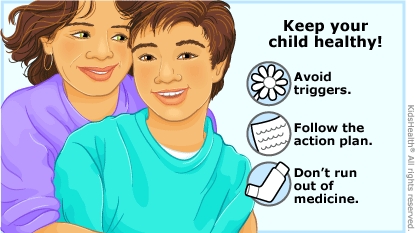Regular medical visits to check on your child's asthma will help them stay healthy and active. During today's visit, the health care provider did an exam and reviewed your child's asthma symptoms. If needed, they made changes to your child's medicines and asthma action plan to keep the asthma under good control.
Make sure you and your child understand the plan and any changes that your health care provider made to it today.



Your child:

Your child has trouble breathing. Signs you might see include:
Call 911 if your child is struggling to breathe, is too out of breath to talk or walk, or turns blue.

What is asthma? Asthma is a condition that causes breathing problems. It is a chronic (ongoing) condition, which means it usually lasts for years, though many kids grow out of it. Asthma can be mild or so severe that it gets in the way of daily activities. But with medicine and the right care plan, asthma symptoms can be managed so that kids can do just about anything they want to do.
What is an asthma flare-up? An asthma flare-up is when asthma symptoms worsen. These symptoms include wheezing, coughing, or feeling out of breath. People with asthma have airways that are overly sensitive to some things (called "triggers"). Being around triggers can bring on asthma symptoms by making the airways in the lungs narrower, swollen, and filled with mucus. Asthma flare-ups are also called asthma attacks or exacerbations. They can happen even when a person takes medicine to control their asthma.
What are common asthma triggers? Triggers can bring on asthma symptoms, but they don't cause asthma. Triggers are different for each person with asthma, but common ones include:
How do asthma medicines work? Asthma medicines generally work in two ways:
Some children will get both types of medicines from one inhaler device. They might need to use this "combination" inhaler every day, with added doses from it when they have symptoms. Some older kids with mild asthma might use a combination inhaler only for quick relief when they have symptoms, or before they exercise. Your health care team will help you figure out which inhaler is best for your child, and how and when to use it.
Are all asthma medicines breathed in, or can some be taken by mouth? Some medicines that ease inflammation can also be taken by mouth. For example, the health care provider may prescribe oral steroids for inflammation during a flare-up, usually for 5–7 days.